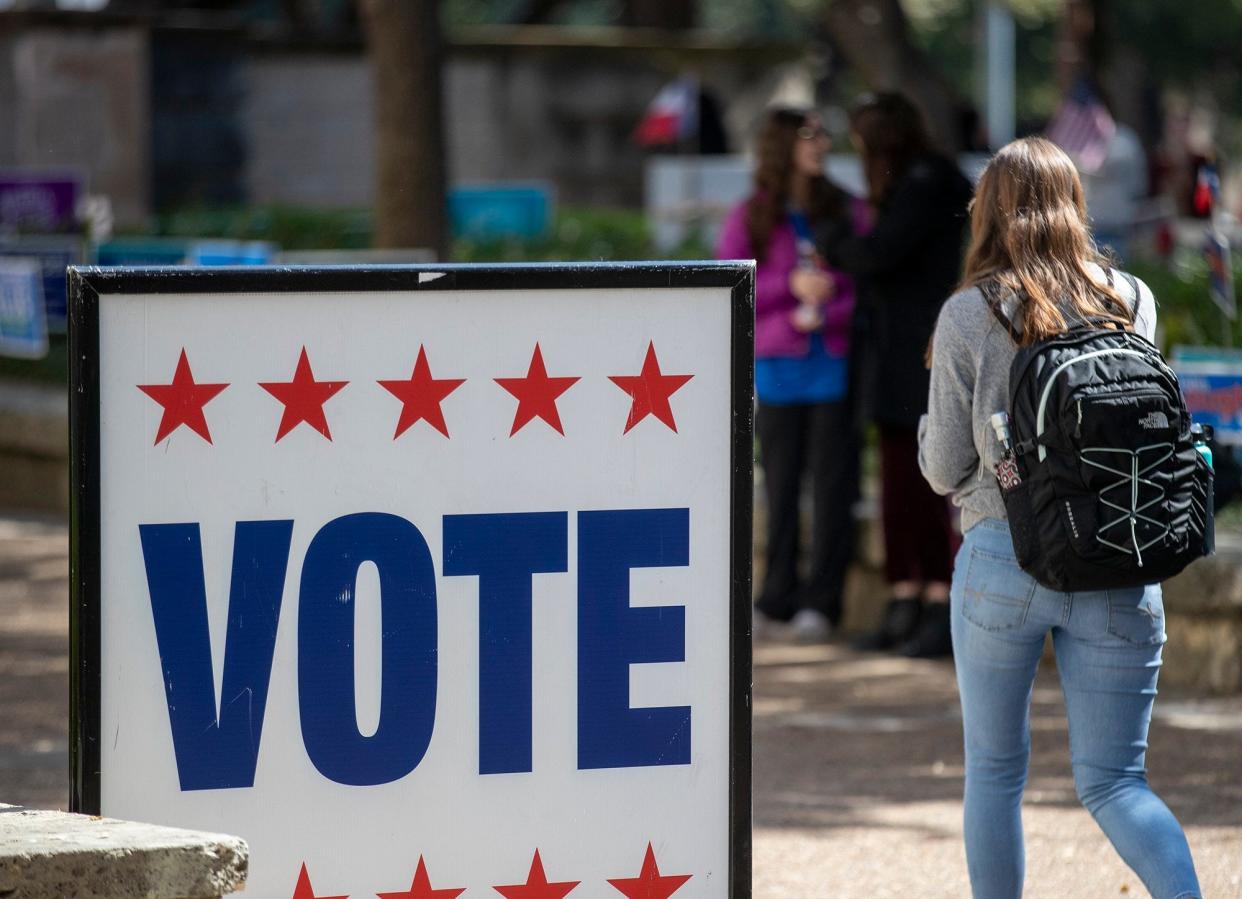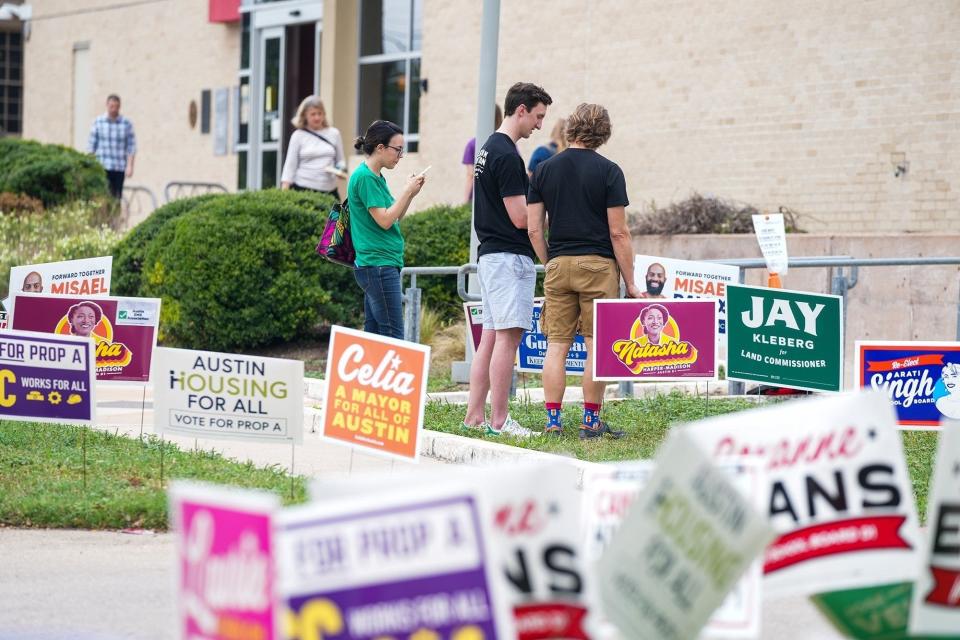Grumet: Court ruling 'a game changer' for much-needed third-party candidates in Texas

- Oops!Something went wrong.Please try again later.
Americans are accustomed to a dazzling array of options — dozens of flavors of ice cream, hundreds of channels on TV, infinite offerings on Amazon — yet when it comes to our government, we’ve got a take-it-or-leave-it two-party system.
And not by choice.
For the better part of two decades, more than half of Americans have told pollsters that the Republican and Democratic parties “do such a poor job” of representing people “that a third major party is needed.” Such movements are always percolating. But they struggle to gain a foothold when election rules are set — you guessed it — by lawmakers in the two major parties.
So I was intrigued to see a federal court ruling late last month that could make it easier for independent and third-party candidates to get on the ballot in Texas, perhaps as early as next year.
U.S. District Judge Robert Pitman of Austin ruled that a specific part of Texas’ election law — the part requiring a massive paper petition campaign for minor candidates trying to get on the ballot — was unconstitutional.
“The paper nomination petition process, as opposed to an electronic process, imposes an unequal burden” on non-major party candidates, Pitman wrote June 26, siding with a half-dozen plaintiffs associated with third parties.
“This could be a game changer for getting alternative voices on the ballot,” said lead plaintiff Mark Miller, a Dripping Springs resident who made two bids as a Libertarian for the Texas Railroad Commission.
The problem with paper petitions
Everyone agrees we need standards. Independent and third-party candidates must demonstrate some level of public support to get on the ballot.
Right now, for statewide office, that means gathering more than 80,000 signatures in less than three months. Candidates can’t start the process until the primary elections are over. If there’s a primary runoff, the window for gathering petitions can be as tight as 30 days.
It’s nearly impossible to gather that many signatures that quickly, in person, without paid petition collectors. Such an effort can easily run $600,000 — a Goliath expense for a David-sized campaign. (Adding to the degree of difficulty: Signatures cannot be accepted from anyone who voted in a GOP or Democratic primary that year.)
That creates an expensive barrier for independent or third-party candidates, when the same number of signatures could be gathered electronically at much less cost. Think about it: It’s easier to find like-minded supporters through social media campaigns and email lists than by stopping random strangers at parks or libraries. Plus, gathering petitions electronically provides opportunities to reach voters in rural areas, whereas in-person petition drives typically focus on heavily populated areas.
Pitman’s order didn’t say what Texas’ new ballot qualification system should look like, just that it can’t use paper petitions.
The Texas Secretary of State’s Office, which oversees elections, declined to comment on next steps. (The state has a couple of weeks to decide whether to appeal the ruling.)

But numerous states use some kind of online petition-gathering platform that is reliable and secure, Oliver Hall, an attorney with the Center for Competitive Democracy, told me. He donated his time to represent the plaintiffs in this case, alongside lawyers with Shearman & Sterling.
In Arizona’s online petition-signing system, for instance, voters enter the number on their driver’s license or state-issued ID to confirm their identity; the petition system then cross-checks them against the state’s database of registered voters.
“It’s really remarkable in this day and age when commercial transactions of every type, from loans and mortgages to your restaurant bill, are done electronically, and yet the state of Texas is still requiring candidates and parties to go out with a huge stack of petitions and pound the pavement,” Hall marveled.
The paper petition process “was hundreds of years old when the state of Texas adopted it in 1905,” Hall added. “I mean, we’re literally talking about the process that the people used to petition the king centuries ago, and Texas is still doing it today.”
Texans deserve more choices
Still, I worry Texas might have a hard time letting it go.
Case in point: Texas still clings to its paper-based system to register voters, even as 42 other states have adopted online voter registration systems that are more accurate and cost-effective. Instead of putting several hundred thousand dollars toward establishing online voter registration, Texas has spent years and untold resources fighting lawsuits over it.
Not coincidentally, Texas ranks among the states that make it most difficult to vote.
Even once people are on the voting rolls, voter turnout in Texas trails many other states. In some cases, people feel like neither major-party candidate is speaking to their concerns; or they live in a district that is so gerrymandered that no one is really competing for their vote.
Both major parties keep drifting toward more extreme positions because nothing is pulling them toward the center. And, in many cases, voters are animated by the party or candidate they’re voting against, as opposed to one they support.
Miller, who was the lead plaintiff in the lawsuit over third-party ballot access, hopes that bringing more candidates into the mix could help change that.
“Imagine in the Texas Legislature if 10% of the 150 (House members) — 15 of them — were from a third, moderate party,” Miller said. “They would wield huge influence in cutting deals. It doesn’t take very many people to force negotiations, to force a more moderate position.”
Plus, a state as diverse as ours should have a greater mix of candidates on the ballot.
“When you go to the grocery store, there's more than two choices of mayonnaise,” Miller said. “There ought to be more than two choices for the voters.”
Grumet is the Statesman’s Metro columnist. Her column, ATX in Context, contains her opinions. Share yours via email at bgrumet@statesman.com or via Twitter at @bgrumet. Find her previous work at statesman.com/news/columns.
This article originally appeared on Austin American-Statesman: Grumet: Court ruling 'a game changer' for third-party candidates

